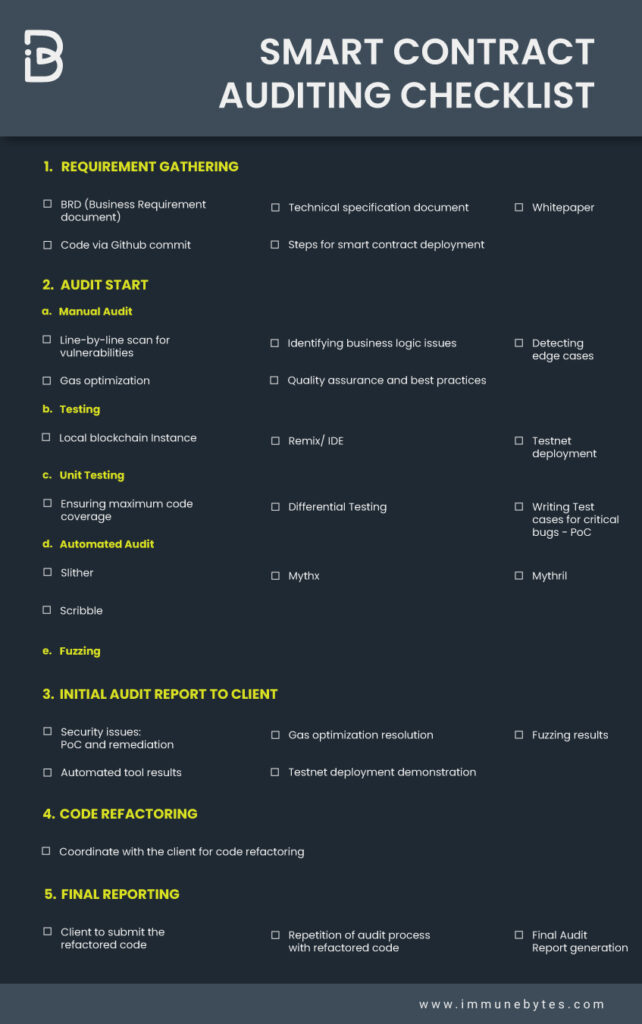How to Conduct Smart Contract Security Audit?

Vitalik Buterin, the founder of Ethereum, and his team proposed combining blockchain and smart contracts, marking the birth of Ethereum as the world computer and platform for smart contracts.
Despite being associated with one of the most secure technologies of the time, smart contracts introduce their vulnerabilities, making them prone to hacking.
It is critical to pay attention to the security aspects of smart contracts in order to prevent their exploitation, and smart contract auditing is the first step.
This article will discuss the smart contract auditing process. But before that, let’s understand what a smart contract audit is.
What is a Smart Contract Audit?
A smart contract audit is an in-depth examination of the project’s code to detect vulnerabilities and determine whether it behaves as expected.
Auditing is usually outsourced to a third party, which provides a second opinion on the code’s functionality while minimizing associated security risks.
Auditing a smart contract provides the following benefits.
- Optimizes code performance
- Enhanced security of DApp
- Protection against hacking and scams
- Increasing investor’s trust in the blockchain project
Additional Read: What is a Smart Contract Security Audit ( The Ultimate Guide)
How to Audit Smart Contracts?
A smart contract audit’s underlying methodology is fairly standard among audit providers. It can be broadly categorized into data collection, verification process, and reporting.
The steps involved in the smart contract audit process are as follows.
Fig: Schematic representation of smart contract audit checklist

Data Collection
Data collection is meant to aware the auditors of the audit scope and the project’s intended behaviour. Smart contract auditors should access reports, including business requirement documents, technical specification documents, project whitepapers, smart contract codes, etc.
Smart Contract Code Verification
Initiating with test running unit test cases written by the developers, checking for the appropriate performance of the code’s functionality. The next step here is manual verification of code by auditors. Auditors examine the code line-by-line, looking for standard vulnerabilities and then determining whether the code behaves as intended.
Security professionals here deploy auditing tools like echidna, slither, mythx, Mythril, scribble, and others to speed up the scanning process. Also, it ensures that no part of the code gets unnoticed and prevents human errors.
All this is complemented with smart contract fuzzing, where random inputs are given to check for unexpected behaviours. Thereby optimizing the code for functionality.
Reporting
Audit reports are usually generated in two phases- Initial and final report.
An initial report is compiled after completion of the auditing process once. It contains proof-of-concept, fuzz test results, vulnerabilities classified based on severity level, and auditor’s recommendations.
Project developers are expected to alter the code per the auditor’s recommendations. Although developers can bypass low severity issues, medium and high issues must be taken into account.
Post code refactoring, auditors undertake reverification of the code utilizing the same process. Lastly, a final report containing all the resolved and unresolved issues is compiled. In fact, few auditing firms score the project based on its security level. The project’s score aids in building trust in the blockchain project and makes it easy to raise funds.
Pros and Cons of Smart Contract Audit
With the rising popularity of the smart contract, auditing has become an integral part of its secure deployment process. Here are some of the pros and cons of auditing a smart contract.
Pros of smart contract audit
- Audit aids in identifying systemic errors and avoids costly mishaps.
- It acts as a security stamp for users, enhancing their trust in the project
- It optimizes the code for gas consumption and functionality
- Helps develop a risk assessment plan and mitigation strategies in case of a hack.
Recommended Read: Merit of Smart Contract
Cons of smart contract audit
- In many cases, smart contract audits weren’t enough to prevent a hack. Hence, it needs to be complemented with other security measures like bug bounty, smart contract insurance, and more.
- There is no standard procedure to determine the credibility of a smart contract auditor. Therefore, a slew of options can sometimes lead to confusion and requires trusting a third party.
- An audit is a time-taking procedure and can delay your project deployment on the mainnet.
Wrap Up
With large sums of money being transacted or locked in smart contracts, they become potential targets for malevolent security breaches.
Therefore, it is essential to come across the security loopholes of smart contracts, and a security audit does exactly that. They not only check code for vulnerability but enhance its performance capacity.












